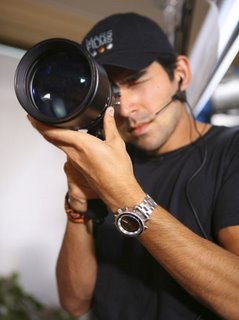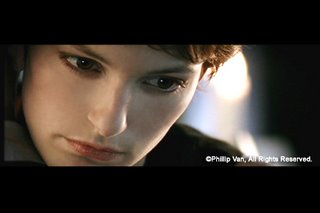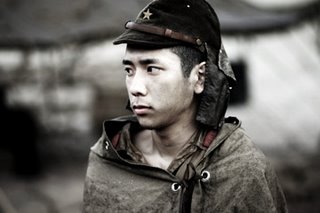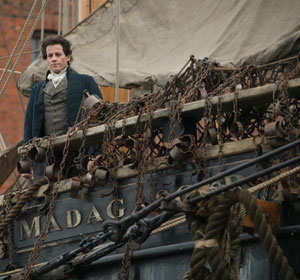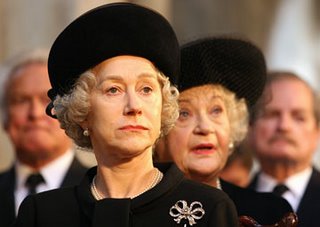
I figured something was going on when the theater was suddenly swarmed with security guards who easily could have doubled as Secret Service agents. When I was asked to surrender my cell phone and put through a gauntlet of bag checks and metal detectors, I knew something was up. My seemingly innocuous ticket for
Borat: Cultural Learnings of America for Make Benefit Glorious Nation of Kazakhstan,” secured through the New York Times' Art and Leisure Weekend, obviously—and clandestinely—had more going for it than a simply screening.
That something paced briskly down the side aisle roughly two hours later as the lights came up and the credits began to role: producer Jay Roach (also the director of the
Austin Powers films) and the man of the hour himself, Sacha Baron Cohen, who appeared in an extremely rare out of character Q&A session.
* * *
What to say about
Borat that hasn't already been said. This was my first time having seen the film. While I assumed it would be hilarious, it wasn't extremely high on my priority list (what comedy is?), though I knew I wanted to see it if for no other reason than to stay current in what has become one of the largest culture conversations in our country.
Yes, the film is funny—side-splittingly, belly-achingly so.
Borat is destined to become the most hotly debated (and beloved) comedy in ages. But if you can watch it with a clean conscience, without any guilt, without turning away once in a while, then you are a bigger person than I.
Cohen, sporting an unwashed gray suit and a fluffy mustache, and speaking through a butchered excuse for English, disappears into the part of Borat, a TV reporter from Kazakhstan sent to America to do a series of reports on what makes our country work. Along the way, he meets a cornucopia of the America public, from driving instructors, rodeo organizers, feminists, Southern aristocrats, Pentecostal preachers and frat boys. Duped into thinking they are helping a third-world journalist learn about American culture, Cohen turns the tables on his condescending interviewees, feigning ignorance until their prejudices and bigotry are revealed. No aspect of intolerance, hypocrisy, arrogance or stupidity is overlooked.
Some consider Cohen’s brilliant skewerings unfair ensnarement. I don’t. Gullibility isn’t the same thing as entrapment. His guerilla ambushes didn’t force anyone to say anything they didn’t want to say. He simply gave them an opportunity to spew what was already boiling inside of them. By pretending to be an ignorant, racist, misogynist, gay-bashing, Jew-hating, gun-loving, warmongering bigot, Cohen elicited the same from those Americans he interviewed. Lynching gays, bringing back slavery, killing all Muslims—there is more than one occasion in
Borat that the laugher ceases on account of all the gasps.
Cohen doesn’t allow you to laugh your head off. Indeed, even the zaniest of his jokes is meant to start in your belly but end up in your head. Those who leave the theater having merely laughed have missed the point. If Borat makes you laugh, Cohen makes you to think.
Borat holds up a savage mirror to American culture that could not have been made at any other time. Not only would its outrageous topics have been censored, but our celebrity culture now more than ever lives to preen in front of the camera. They’ll take their 15-minutes of fame any way they can, even if it means being recorded on digital video as monsters.
America, you got punk’d and the result is horrifying.
Borat paints a picture of the American landscape that would induce nightmares were you not laughing so hard.
Borat, from its highbrow to its lowbrow humor, is a satire disguised as a gross-out comedy. Cohen is the ancient court jester speaking truth—even rude truth—to power. He is fully aware that comedy allows you to comment on things drama would never touch, to face things you would otherwise never know existed, and to ingest it all in such a way that we can laugh at ourselves even while being genuinely repulsed.
Part improviser, part brilliant comedian, and part courageous political satirist, how Cohen does it with a straight face is beyond me.
* * *
For his part, Cohen never suspected that Borat, first seen in short segments on his
Da Ali G Show, could be made into a feature length film.
“I couldn’t imagine doing the character for anything over 30 seconds. I thought it would get old. Who’d want to watch that?”
It was director Larry Charles (
Curb Your Enthusiasm) who convinced him a feature film was possible.
Though it is largely transparent,
Borat did require a script.
“We needed something to pull the plot along,” Cohen said. Hewing out a rough story about a Kazakhstani journalist who runs afoul of his reporting duties in the United States when he obsesses over finding Pamela Anderson gave Cohen just enough framework to hold the story together but also allow him wide enough latitude to move around in response to the film’s more spontaneous moments. Each scene had to be funny but also work as a genuine story beat.
“We knew what jokes we wanted to do,” Cohen said. “We believed people would react exactly the way they did. While it’s true that we wanted to make the most offensive film imaginable, we were also interested in conducting a social experiment. Some very dark things were revealed.”
The film had to take place in America. In England, Cohen is widely recognized, despite his chameleon-like ability to almost entirely disappear into whatever role he’s playing. Cohen bet that few people in the United States would know him.
“That the advantage of no one in America having actually watched
Ali G, he confessed almost sheepishly.
Although his days of anonymity in America are now gone, during the filming, he was rarely ever recognized and despite his zany, over-the-top antics, almost always taken seriously.
Cohen admits that there were several instances when he felt in danger for his life during filming. But it wasn’t always when you might think.
“We were almost arrested 38 times,” Cohen said. “In fact the only reason we left New York City when we did is because we were told a warrant had been issued for my immediate arrest. Only later did we find out we were trailed by the Secret Service and the FBI.”
Each time Cohen was confronted by law enforcement, he stayed completely in character.
“I’d say to them, ‘Are you the KGB?’”
One of the most dangerous moments of the film came during the rodeo sequence. Following his blasphemous rendition of the Kazak national anthem set to the music of “The Star Spangled Banner,” Cohen had to flee to one of the production’s RVs. Soon an enraged crowd surrounded the vehicle, crying that they wanted to lynch Cohen. A quick-thinking cameraman stuffed the tapes down his underwear and they fled the area as soon as a large enough hole developed in the crowd.
As bad as that was, perhaps the most treacherous scene of the film was one Cohen himself wrote, but when it came time to perform, wanted to chicken out on.
“I did not want to do the naked fight scene,” he admits. “Especially when I first saw Ken (Davitian, the actor who played Azamat Bagatov) on the bed, naked. The only way I agreed to do it is if we showered—I mean full showers—between each and every take. I saw things I don’t even want to describe.”
Throughout the Q&A, audience members peppered Cohen with questions about offended parties or the pending lawsuits being leveled at the film from its “unwitting” participants. Cohen refused to answer anything remotely having to do with such issues, instead replying with nonsensical answers about the weather or his wardrobe. The woman next to me who who’d carefully crafted and written out her question about the film’s perceived anti-Semitism (Cohen himself is an observant Jew) got just such an answer and went away fuming.
For his part, producer Jay Roach was full of nothing but praise for his funnyman.
“It is so hard to be that much in character. What most people don’t know is that Sacha never broke character, not once. While we were out and the cameras were rolling, he was Borat. He had to ready for anything that came at him. You see a scene that only lasts a few minutes, but in real life that scene lasted for hours. Watching Sacha is like watching a magician.”





